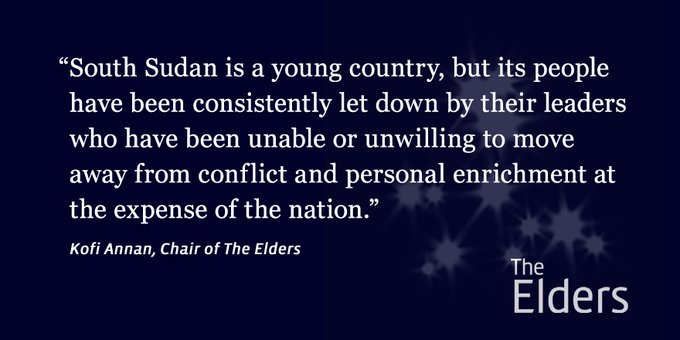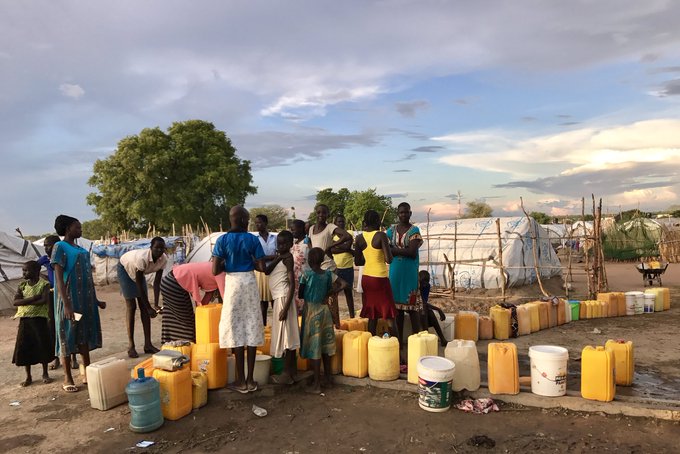Thirteen South Sudanese soldiers accused of gang raping foreign aid workers and killing a local journalist last July appeared in a military court on Tuesday. The soldiers face trial for rape, torture, killing and looting during the attack.
The case is seen as a test of South Sudan's ability to try war crimes, with the next court date scheduled for June 6.
The attack, which was one of the worst to target aid workers during the country's civil war, occurred on July 11 last year as fighting erupted once again between President Salva Kiir’s troops and opposition forces loyal to former vice president Riek Machar, leaving an August 2015 peace deal in tatters.
Witnesses told Reuters that armed men besieged the Terrain Hotel in the capital Juba over several hours. Those trapped in the hotel frantically phoned peacekeepers stationed less than a mile away with the UN Mission in South Sudan (UNMISS) and begged for help, but none came. A subsequent UN report found that multiple requests were made to peacekeepers from China, Ethiopia, India and Nepal to dispatch forces, "but each UNMISS contingent turned down the request, indicating their troops were fully committed".
The report said that a "lack of leadership" in the UN mission resulted in a "chaotic and ineffective response".
The Kenyan military head of the UN peacekeeping mission was fired over the incident. His replacement, Lieutenant General Frank Mushyo Kamanzi of Rwanda, took over the mission on Monday, almost a year later.
The British former manager of the Terrain Hotel, Mike Woodward, told the court that “between 50 and 100” soldiers arrived in the afternoon and later looted the hotel.
"One group proceeded straight to the bar and restaurant while another group continued to the residential area," he said.
He described "the beating and torture of almost every person in the entire building", including mock executions.
“Five women working with humanitarian organisations were then raped. [Local journalist] John Gatluak was shot at 6:15pm,” Woodward said.
The prosecution said it "absolutely" has the necessary evidence to convict the accused, citing testimony from witnesses and victims, including an American man who was shot in the leg.
"We expect the same as from any normal trial," said Woodward, who was the only witness to testify on Tuesday. "We want justice for the victims, compensation for what was looted and we want this to serve as an example for people who commit similar crimes."
Defense lawyer Peter Malual Deng dismissed the charges, saying Woodward’s testimony was not sufficient to prove the allegations. “What I know [is] the area was under operation at the time and rebels were controlling the area,” Deng said.
Chief prosecutor Abukuk Mohammed Ramadan said some of the survivors of the attack were expected to return to testify. “Some of the victims left South Sudan, especially the ones who were raped,” he said. “They went back to their countries and we are expecting them back.”
If convicted of rape, the soldiers could face up to 14 years in prison. If convicted of murder, they face aminimum of 10 years and could be sentenced to death.
Civil war broke out in South Sudan in 2013 when President Kiir accused Machar of plotting a coup. An August 2015 peace deal collapsed last July when fierce fighting erupted in Juba between forces loyal to Kiir and Machar.
Both UN investigators and rights groups have frequently accused the army and rebels of murder, torture and rape since the civil war began in 2013. They say the crimes almost always go unpunished.
As the trial began, South Sudan's military announced that it is committed to "human rights, the rule of law and the transparency of the legal system".
Ethnic conflict
The trial comes shortly after a new UN report exposed potential war crimes by the army in its targeting and killing of civilians. The international community has repeatedly expressed concern about impunity for widespread military abuses in the civil war, which is well into its fourth year and has left tens of thousands dead.
Across South Sudan accounts continue to roll in of government soldiers killing civilians based on their tribes amid the continuing political conflict between Kiir, a member of the majority Dinka community, and Machar, an ethnic Nuer.
In May, South Sudan reclaimed the No. 1 spot on the world's Fragile States Index, compiled by the Washington-based non-profit The Fund for Peace. Violence escalated to its highest level in more than three years in April, according to ACLED, a non-profit focused on collecting data on political violence and protest in developing nations.
South Sudan's civil war has killed more than 50,000 people and plunged parts of the nation into famine. It's being called a man-made disaster, and civilians and aid groups largely hold army soldiers responsible.
According to South Sudan's independent Human Rights Observatory, 473 civilians were unlawfully killed across the country in April alone. Accounts of execution-style murders, the burning of bodies and revenge attacks were the most common. While opposition forces also have been blamed for some killings, the report concluded that most deaths were caused by government forces and allied militias.
People from minority ethnic groups say they regularly lie to men in uniform when asked about their ethnicity for fear of being killed.
Panicked communities are seeking refuge in United Nations-protected camps or fleeing to neighbouring countries.
Clashes erupted in the northwestern town of Wau on April 10, leaving at least 16 civilians dead in what Human Rights Watch called an "act of collective punishment, with soldiers taking revenge against unarmed civilians based on their ethnicity".
"They kept asking him if our neighbours were Nuer and which tribe we were from," said Juma, 24, in comments to AP. When her husband refused to turn over their friends, the soldiers forced him outside and shot him in the head.
Since the unrest in Wau, aid workers say they have seen a 46 percent increase in the number of people who are fleeing to the local UN camp on the edge of town. Almost 40,000 people have taken shelter there, making it the most congested UN protection site in the country, with thousands lacking basic necessities such as clean water and food.
A joint statement from UN aid agencies in February warned that 100,000 people were at risk of a man-made famine in South Sudan that threatens another 1 million people.
"A formal famine declaration means people have already started dying of hunger. The situation is the worst hunger catastrophe since fighting erupted more than three years ago," said the statement, which was signed by the World Food Programme, the UN children's agency UNICEF and the Food and Agricultural Organisation.
(FRANCE 24 with AP and REUTERS)







0 comments:
Post a Comment